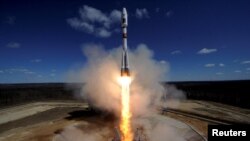Russia's latest space launch failures have prompted authorities to take a closer look into the nation's struggling space industry, the Kremlin said Thursday.
A Russian weather satellite and nearly 20 micro-satellites from other nations were lost following a failed launch from Russia's new cosmodrome in the Far East on November 28. And in another blow to the Russian space industry, communications with a Russian-built communications satellite for Angola, the African nation's first space vehicle, were lost following its launch on Tuesday.
Asked about the failures, President Vladimir Putin's spokesman, Dmitry Peskov, said Thursday that authorities warrant a thorough analysis of the situation in the space industry.
Amid the failures, Russian officials have engaged in a round of finger-pointing.
Deputy Prime Minister Dmitry Rogozin, who oversees Russia's military industrial complex and space industries, said in a television interview Wednesday that the November 28 launch from the new Vostochny launch pad in Russia's Far East failed because the rocket had been programmed to blastoff from the Russia-leased Baikonur launch pad in Kazakhstan instead of Vostochny. He accused the Russian space agency Roscosmos of "systemic management mistakes."
Roscosmos fired back Thursday, dismissing Rogozin's claim of the flawed programming. It did acknowledge some shortcomings that led to the launch failure and said a number of officials were reprimanded.
Rogozin quickly riposted on Facebook, charging that Roscosmos was "trying to prove that failures occur not because of mistakes in management but just due to some `circumstances."'
The cause of the failure of the Angolan satellite hasn't been determined yet. Communications with the satellite, which was built by the Russian RKK Energia company, a leading spacecraft manufacturer, were lost after it entered a designated orbit.
Russia has continued to rely on Soviet-designed booster rockets to launching commercial satellites, as well as crews and cargo to the International Space Station. A trio of astronauts from Russia, Japan and the United States arrived at the space outpost last week following their launch from Baikonur.
While Russian rockets have established a stellar reputation for their reliability, a string of failed launches in recent years has called into question Russia's ability to maintain the same high standards for manufacturing space equipment.
Glitches found in Russia's Proton and Soyuz rockets in 2016 were traced to manufacturing flaws at the plant in Voronezh.Roscosmos sent more than 70 rocket engines back to production lines to replace faulty components, a move that resulted in a yearlong break in Proton launches.
The suspension badly dented the nation's niche in the global market for commercial satellite launches. Last year, Russia for the first time fell behind both the U.S. and China in the number of launches.
While Russia plans to continue to use Baikonur for most of its space launches, it has poured billions of dollars in to build the new Vostochny launch pad. A launch pad for Soyuz finally opened in 2016, but another one for the heavier Angara rockets is only set to be completed in late 2021 and its future remains unclear, drawing questions about the feasibility of the expensive project.
Work at Vostochny also has been dogged by scandals involving protests by unpaid workers and the arrests of construction officials accused of embezzlement.
Nataliya Vasilyeva in Moscow contributed to this report.
